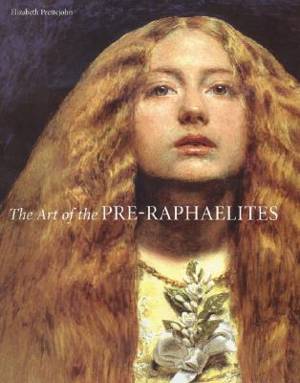
- Afhalen na 1 uur in een winkel met voorraad
- Gratis thuislevering in België vanaf € 30
- Ruim aanbod met 7 miljoen producten
- Afhalen na 1 uur in een winkel met voorraad
- Gratis thuislevering in België vanaf € 30
- Ruim aanbod met 7 miljoen producten
Zoeken
Omschrijving
Though always controversial in art circles, the Pre-Raphaelites have also always been extremely popular with museum goers. This accessible new study provides the most comprehensive view of the movement to date. It shows us why, a century and a half later, Pre-Raphaelite art retains its power to fascinate, haunt, and often shock its viewers.
Calling themselves the Pre-Raphaelite Brotherhood, Dante Gabriel Rossetti, John Everett Millais, and William Holman Hunt produced a statement of ideas that revolutionized art practice in Victorian England. Critical of the Royal Academy's formulaic works, these painters believed that painting had been misdirected since Raphael. They and the artists who joined with them, including William Michael Rossetti, James Collinson, and Frederick George Stephens, created bright works representing nature and literary themes in fresh detail and color. Considered heretical by many and frequently admonished for a lack of grace in composition the group disbanded after only a few years. Yet its artists and ideals remained influential; its works, greatly admired. In this richly illustrated book, Elizabeth Prettejohn raises new and provocative questions about the group's social and artistic identity. Was it the first avant-garde movement in modern art? What role did women play in the Pre-Raphaelite fraternity? How did relationships between the artists and models affect the paintings? The author also analyzes technique, pinning down the distinctive characteristics of these painters and evaluating the degree to which a group style existed. And she considers how Pre-Raphaelite art responded to and commented on its time and place a world characterized by religious and political controversy, new scientific concern for precise observation, the emergence of psychology, and changing attitudes toward sexuality and women. The first major publication on the Pre-Raphaelite movement in more than fifteen years, this exquisite volume incorporates the swell of recent research into a comprehensive, up-to-date survey. It comprises well over two hundred color reproductions, including works that are immediately recognizable as Pre-Raphaelite masterpieces, as well as lesser-known paintings that expand our appreciation of this significant artistic departure.Specificaties
Betrokkenen
- Auteur(s):
- Uitgeverij:
Inhoud
- Aantal bladzijden:
- 304
- Taal:
- Engels
Eigenschappen
- Productcode (EAN):
- 9780691070575
- Verschijningsdatum:
- 12/11/2000
- Uitvoering:
- Hardcover
- Formaat:
- Genaaid
- Afmetingen:
- 229 mm x 284 mm
- Gewicht:
- 1564 g

Alleen bij Standaard Boekhandel
+ 244 punten op je klantenkaart van Standaard Boekhandel
Beoordelingen
We publiceren alleen reviews die voldoen aan de voorwaarden voor reviews. Bekijk onze voorwaarden voor reviews.











